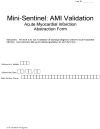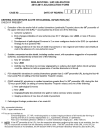Validation of acute myocardial infarction in the Food and Drug Administration's Mini-Sentinel program
- PMID: 22745038
- PMCID: PMC3601831
- DOI: 10.1002/pds.3310
Validation of acute myocardial infarction in the Food and Drug Administration's Mini-Sentinel program
Abstract
Purpose: To validate an algorithm based upon International Classification of Diseases, 9(th) revision, Clinical Modification (ICD-9-CM) codes for acute myocardial infarction (AMI) documented within the Mini-Sentinel Distributed Database (MSDD).
Methods: Using an ICD-9-CM-based algorithm (hospitalized patients with 410.x0 or 410.x1 in primary position), we identified a random sample of potential cases of AMI in 2009 from four Data Partners participating in the Mini-Sentinel Program. Cardiologist reviewers used information abstracted from hospital records to assess the likelihood of an AMI diagnosis based on criteria from the Joint European Society of Cardiology and American College of Cardiology Global Task Force. Positive predictive values (PPVs) of the ICD-9-based algorithm were calculated.
Results: Of the 153 potential cases of AMI identified, hospital records for 143 (93%) were retrieved and abstracted. Overall, the PPV was 86.0% (95% confidence interval; 79.2%, 91.2%). PPVs ranged from 76.3% to 94.3% across the four Data Partners.
Conclusions: The overall PPV of potential AMI cases, as identified using an ICD-9-CM-based algorithm, may be acceptable for safety surveillance; however, PPVs do vary across Data Partners. This validation effort provides a contemporary estimate of the reliability of this algorithm for use in future surveillance efforts conducted using the Food and Drug Administration's MSDD.
Copyright © 2012 John Wiley & Sons, Ltd.
Conflict of interest statement
Figures










Similar articles
-
Chart validation of inpatient ICD-9-CM administrative diagnosis codes for acute myocardial infarction (AMI) among intravenous immune globulin (IGIV) users in the Sentinel Distributed Database.Pharmacoepidemiol Drug Saf. 2018 Apr;27(4):398-404. doi: 10.1002/pds.4398. Epub 2018 Feb 15. Pharmacoepidemiol Drug Saf. 2018. PMID: 29446185 Free PMC article.
-
Design for validation of acute myocardial infarction cases in Mini-Sentinel.Pharmacoepidemiol Drug Saf. 2012 Jan;21 Suppl 1(0 1):274-81. doi: 10.1002/pds.2314. Pharmacoepidemiol Drug Saf. 2012. PMID: 22262617 Free PMC article.
-
Validation of anaphylaxis in the Food and Drug Administration's Mini-Sentinel.Pharmacoepidemiol Drug Saf. 2013 Nov;22(11):1205-13. doi: 10.1002/pds.3505. Epub 2013 Sep 5. Pharmacoepidemiol Drug Saf. 2013. PMID: 24038742 Free PMC article.
-
Health outcomes coding trends in the US Food and Drug Administration's Sentinel System during transition to International Classification of Diseases-10 coding system: A brief review.Pharmacoepidemiol Drug Saf. 2021 Jul;30(7):838-842. doi: 10.1002/pds.5216. Epub 2021 Mar 17. Pharmacoepidemiol Drug Saf. 2021. PMID: 33638243 Free PMC article. Review.
-
A Systematic Review of Case-Identification Algorithms Based on Italian Healthcare Administrative Databases for Three Relevant Diseases of the Cardiovascular System: Acute Myocardial Infarction, Ischemic Heart Disease, and Stroke.Epidemiol Prev. 2019 Jul-Aug;43(4 Suppl 2):37-50. doi: 10.19191/EP19.4.S2.P037.091. Epidemiol Prev. 2019. PMID: 31650805
Cited by
-
Cardiovascular Safety in Postmenopausal Women and Men With Osteoporosis Treated With Denosumab and Zoledronic Acid: A Post-Authorization Safety Study.JBMR Plus. 2023 Aug 21;7(10):e10793. doi: 10.1002/jbm4.10793. eCollection 2023 Oct. JBMR Plus. 2023. PMID: 37808402 Free PMC article.
-
Clinical phenotyping in selected national networks: demonstrating the need for high-throughput, portable, and computational methods.Artif Intell Med. 2016 Jul;71:57-61. doi: 10.1016/j.artmed.2016.05.005. Epub 2016 Jun 25. Artif Intell Med. 2016. PMID: 27506131 Free PMC article.
-
Validation of acute myocardial infarction cases in the national health insurance research database in taiwan.J Epidemiol. 2014;24(6):500-7. doi: 10.2188/jea.je20140076. Epub 2014 Aug 30. J Epidemiol. 2014. PMID: 25174915 Free PMC article.
-
Acute myocardial infarction: Development and application of an ICD-10-CM-based algorithm to a large U.S. healthcare claims-based database.PLoS One. 2021 Jul 1;16(7):e0253580. doi: 10.1371/journal.pone.0253580. eCollection 2021. PLoS One. 2021. PMID: 34197488 Free PMC article.
-
Chart validation of inpatient ICD-9-CM administrative diagnosis codes for acute myocardial infarction (AMI) among intravenous immune globulin (IGIV) users in the Sentinel Distributed Database.Pharmacoepidemiol Drug Saf. 2018 Apr;27(4):398-404. doi: 10.1002/pds.4398. Epub 2018 Feb 15. Pharmacoepidemiol Drug Saf. 2018. PMID: 29446185 Free PMC article.
References
-
- Behrman RE, Benner JS, Brown JS, McClellan M, Woodcock J, Platt R. Developing the Sentinel System--a national resource for evidence development. N Engl J Med. Feb 10;364(6):498–9. - PubMed
-
- Robb MA, Racoosin JA, Sherman RE, Gross TP, Ball R, Reichman ME, et al. The US Food and Drug Administration’s Sentinel Initiative: expanding the horizons of medical product safety. Pharmacoepidemiol Drug Saf. 2012 Jan;21(Suppl 1):9–11. - PubMed
-
- Platt R, Carnahan RM, Brown JS, Chrischilles E, Curtis LH, Hennessy S, et al. The U.S. Food and Drug Administration’s Mini-Sentinel program: status and direction. Pharmacoepidemiol Drug Saf. 2012 Jan;21(Suppl 1):1–8. - PubMed
-
- Goff SL, Feld A, Andrade SE, Mahoney L, Beaton SJ, Boudreau DM, et al. Administrative data used to identify patients with irritable bowel syndrome. J Clin Epidemiol. 2008 Jun;61(6):617–21. - PubMed
-
- Andrade SE, Gurwitz JH, Chan KA, Donahue JG, Beck A, Boles M, et al. Validation of diagnoses of peptic ulcers and bleeding from administrative databases: a multi-health maintenance organization study. J Clin Epidemiol. 2002 Mar;55(3):310–3. - PubMed
Publication types
MeSH terms
Grants and funding
LinkOut - more resources
Full Text Sources
Medical

